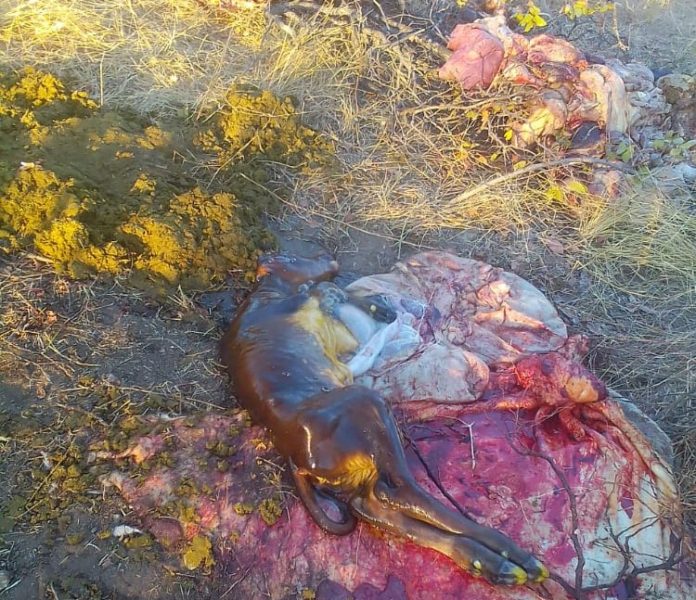By Jess de Klerk
Stock theft is an emotional topic for farmers but the full impact has not yet been realized. Most farmers seems to be apathetic towards the problem and only react when someone steals from them. Most of the operations and patrols focusses on the so-called runners who are responsible for stealing the stock. Farmers and the SAPS are using an enormous amount of energy, time, and resources to combat stock theft, but they are fighting a losing battle at this point.
We will have to change our strategy to combat the wave of stock theft and this can only be done by looking at the extent, modus operandi of the syndicates and outlets of stolen stock.
What is the extent and worth of stolen stock? There are more than 131 000 cases of stolen stock each year. The Free State alone has about 4 000 stock theft cases reported yearly. A significant amount of stock thefts are not reported as farmers feel that nothing will be done in any case which means that thousands more cases need to be added to these numbers. According to Statistics South Africa the non-reporting of stock theft comes down to about 70.7% of cases. UNISA estimates the value of livestock stolen during 2019/2020 to be around R1 179 458 600. On average there are about 182 cattle, 282 sheep and 138 goats being stolen every day in South Africa. The road between Ficksburg and Senekal has been monitored for a while and during this time there was on average about 40 vehicles with trailers transporting sheep per month. The trailers held a minimum of 30 sheep at a time which comes down to about 14 400 sheep per year that are being transported only on this route.
Where do the sheep come from and where is the outlet area? The majority of the public is of the opinion that stock that is stolen is being used as food sources in local townships. However, when we look at the numbers it becomes clear that there does not exist such a large informal market for stock. Bheki Cele, Minister of Police, asked during his visit to Senekal after the murder of Brendin Horner, where stolen stock goes and how the thefts take place. We realised that stock is being stolen by runners who are paid as little as R500 per night. These people steal enough livestock to fulfill the order, these livestock are then either hidden for a while or immediately loaded onto bakkies and trailers to be distributed. Sheep that remain after the order has been filled are sold in the local informal settlements. Cattle are driven for several kilometers and young lambs that slow down the process are swiftly killed. Livestock is then transported to neighboring countries and farms until the case has cooled down. Citizens of Lesotho are often involved in stock theft in the Free State and farmers in Lesotho are suffering under the same syndicates.
Where are the stolen stock going to? The extent of stock theft is simply too great to just be sold on the informal market. Stolen stock are rebranded and then added once again into the production chain where they are sold at auctions to farmers, livestock speculators and abattoirs. Stock theft, as such, is then a specialised, organised crime. Cele mentioned that the impact of stock theft is just as big, if not bigger, than that of robbery of cash in transit vehicles and therefore must be taken seriously. To combat stock theft effectively alternative approaches and strategies needs to be considered.
It is clear that there should be a greater focus on transport, outlets, buyers and identification of stock to destabilise the stock theft ring. The provincial office of the SAPS in the Free State has already done a lot in this matter. There were a lot of operations in the province over the course of the year. One of the operations involved stopping vehicles with trailers transporting livestock for a few months to check their documentation and loads. A lot of these drivers did not have the correct documentation.
In time a lot of these people registered their own brandings and added the brand to their documentation, even citizens from Lesotho has their own brandings. Fines have been issued but have since been withdrawn or have simply not been paid. The National Prosecution Authority (NPA) sometimes refuses to prosecute these people or cases are simply removed from the court roll – this tendency also needs to be placed under scrutiny. Cases that are simply withdrawn or removed undo’s the work of the SAPS and demotivates them to do something about the problem in the future.
Livestock farmers, at the end of the day, must carry the consequences of poor prosecution. The only way this problem will be actively addressed is to ensure that offenders are brought before the court. Documentation and ownership of stock will be assessed carefully, and offenders must be prosecuted. Stock theft needs to be investigated as an organised crime with the help of proper experts.
Who is the stock thieve? It could be your neighbour, your local livestock speculator or auctioneer. Do not be the one to buy stolen items on the street corner. Farmers must take responsibility for branding their stock and having the correct documentation filled out to avoid the possibility of a criminal record. Auctioneers and speculators can no longer shrug and say that they did not know. It is high time that this industry is cleaned up.
Operations must be approached from multidisciplinary teams including SAPS, crime intelligence, SARS, Department of Home Affairs and farm safety structures, Stock theft units are not up to the task to fight this problem alone because of poor leadership, shortage of staff and shortage of the necessary expertise.
The SAPS have especially done great work in the eastern part of the Free State where outlet points and the transport of stock is monitored to ensure the legitimacy of events. Many arrests and warrants have been issued during this operation. These offenders must be addressed by livestock theft units but these units have been failing for years to perform their duties.
The stock thieves and syndicates are unscrupulous and violent and will not hesitate to kill.








